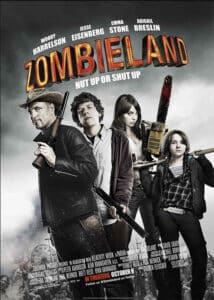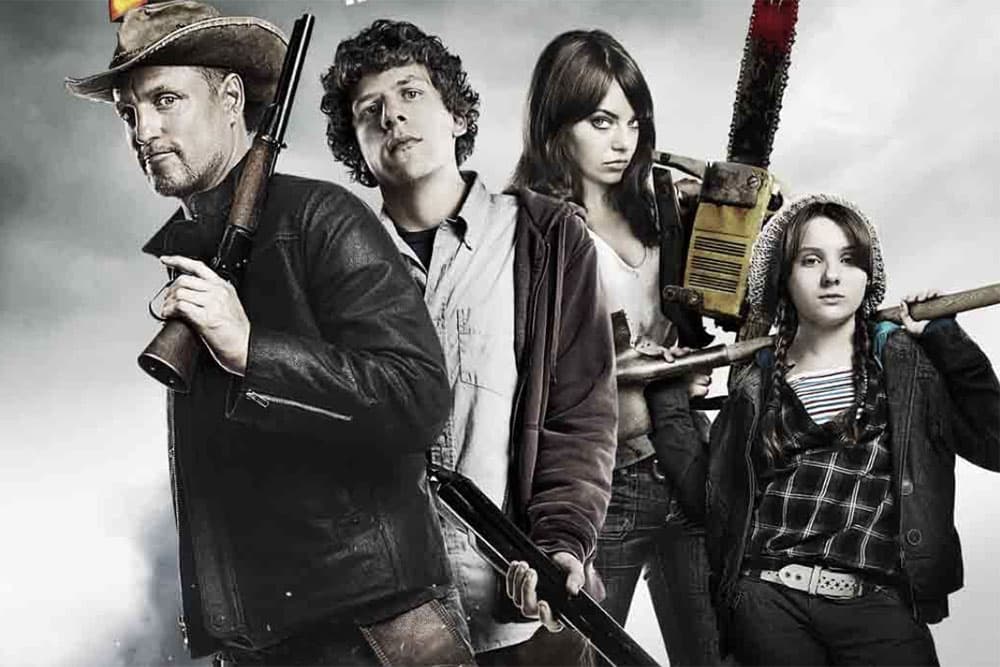
I’m fuzzy on the whole good/bad thing. What do you mean, “bad”?
– Peter Venkman (Bill Murray), Ghostbusters (1984)
“Hello America,” says Columbus (Jesse Eisenberg). “I wish I could tell this is still America, but you can’t have a country without people. There are no people here.” Trundling across streets strewn with rusting cars, he looks awfully ordinary, his jeans are loose, and his hair shaggy. As Columbus goes on to explain, the loss of what he thought of as America still feels raw and traumatic, and what’s sprung up in its place is grim in most every sense. Still, he’s got an attitude – not quite tough, more like sarcastic. And so he talks on, recalling just how America became “the United States of Zombieland”, how “things changed from bad to total shit show.”
As you soon learn in Zombieland, a virus killed of the people. It’s usually a virus in zombie films, manmade or extraterrestrial, or somehow voodoo. Zombieland doesn’t bother much with causes or origins but instead takes some representational glee in the consequences – zombies who might have popped up from the ground in Michael Jackson’s Thriller video, bloody-jawed and drippy-eyed and generally mucky. Grunting, lurching, and stumbling, the zombies in Columbus’ path tend to be slow on the uptake but also relentless.
He details his “rules”, like keep up your cardio (a flashback shows that fat victims are first to be run down and ravaged), “don’t get all stingy with your bullets”, and avoid public bathrooms (when the Gas N’ Gulp Station Manager appears in a stall, you know he won’t be ready for the grisly creature that clambers under the door). Zombieland adopts its narrator’s attitude, plunking his rules on-screen so they hover, numbered, near the action currently illustrating his point: as he runs from opened-mouth zombies, “Rule #1: Cardio” hovers, and as his vehicle crashes and sends a monster pitching through a store window, “Rule #4: Seatbelts”, makes a cute joke about his good habit.
Zombieland does well enough in its early minutes, cruising along with Columbus’ adventures and observations, then picks up a little unexpected speed when he meets another “noncannibal survivor”, Tallahassee (a perfect Woody Harrelson). Calling one another the names of the places they’re from (because, as Tallahassee asserts, “There’s no sense in getting too familiar”), these boys make an amiably edgy pair, as unlike one another as they could be. Where Columbus is pleasantly naïve and hopeful despite his recent experience, Tallahassee is an unhinged and self-absorbed Mickey Knox without Mallory.
Where Tallahassee is happy to find a fellow traveler, Tallahassee has fortunately discovered an outlet for his brutal talents (“He said he was in the ass-kicking business,” reports Columbus). He keeps nominally sane by enjoying “the little things”, like eating Twinkies and blowing the heads off monsters. That he’s unable to find a Twinkie in this harsh new world is enough to make him grumpy. Columbus does his best to placate his new partner, concerned that further loss of control, like not following his rules, which are recorded in his notebook, will lead to even more chaos.
When Tallahassee cuts loose, whacking zombies with bats and hedge shears or shooting at them with gleeful abandon, he’s most charming. So Columbus begins to emulate him, smashing shelves full of souvenirs in an “Indian”-themed truck stop and sharing zombie-encounter stories to measure who has the Zombie Kill of the Week. Learning to be a man, of sorts, from this lunatic, Columbus can let go of his background, his nerdish disposition, embarrassing virginity, and worry of becoming his fearful, angry, shut-in parents.
It’s when the boys meet a couple of girls that Columbus takes Tallahassee’s instruction most seriously, even as, per the coming-of-age formula, he also must make some decisions on his own. Smitten by the wily Wichita (Emma Stone) and immediately protective of her 12-year-old sister, Little Rock (Abigail Breslin), Columbus resents Tallahassee’s glib evaluation of their repeated efforts to steal his weapons and vehicles. Though Columbus suggests they’re all in the same apocalyptic boat and might as well learn to share, Tallahassee and Wichita are inclined to judge one another, for being too girly or macho, for bluntly stating desires and reducing the future to bare essentials (like breathing). When Wichita and Columbus begin to swap bad date stories, he’s enchanted but also terrified that he’ll never be the man he imagines she wants.
Until now, Columbus has talked himself out of being that imaginary figure (one of his fundamental rules: “Don’t be a hero”). So when he sees that he might want to be heroic, impress this girl, and stay alive to boot, he’s confused. To its credit, Zombieland doesn’t so much follow this trajectory as it watches him stumble into it. The formula is less the endpoint than a point of departure, a road trip that takes Columbus and company from teeny-town Texas to Los Angeles, where Tallahassee is thrilled to meet his idol Bill Murray (playing himself, as you’d like to imagine him), and trade lines from Ghostbusters.
Here again, Columbus learns a lesson – a hard, if goofy one – and Zombieland gets to be cynical and optimistic, dark and silly, at the same time. If learning how to be a man must be the resolution of such hybrid action-comic-horrific fare (see also: Shaun of the Dead), the roundabout, self-knowing and self-mocking route can at least be entertaining.

